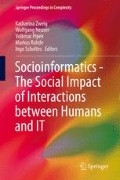Abstract
Collective decision-making is a key concern for every social group; the clarity, effectiveness and participatory characteristics of the process are central to democratic societies and procedures.Networked computer systems in general and the increasing attention to social aspects in their purpose and design offer the individual novel means for participation, but also entail specific systemic problems. These can be either variations of existing general sociological and political issues, or arising also from the system’s characteristic technical design and structure. This article provides an overview of systems for collective and dynamic decision-making with their peculiarities, focusing on the three core interacting aspects: anonymity, immediacy and electoral delegation.
Access this chapter
Tax calculation will be finalised at checkout
Purchases are for personal use only
References
Boldi P, Bonchi F, Castillo C, Vigna S (2011) Viscous democracy for social networks. Commun ACM 54(6):129–137
Bugzilla Bug Tracking System: The Bugzilla Guide – 4.4.1 Release (2014). http://www.bugzilla.org/docs/4.4/en/pdf/Bugzilla-Guide.pdf
Carroll L (1884) The principles of parliamentary representation. Harrison and Sons, London
Ford B (2002) Delegative democracy. http://www.brynosaurus.com/log/2002/0515-DelegativeDemocracy.pdf
Hamman JR, Weber RA, Woon J (2011) An experimental investigation of electoral delegation and the provision of public goods. Am J Polit Sci 55(4):738–752
Heylighen F (1999) Collective intelligence and its implementation on the web: algorithms to develop a collective mental map. Comput Math Organ Theory 5(3):253–280
Jabbusch S (2011) Liquid Democracy in der Piratenpartei
Kuhn I (2013) Liquid democracy: Chancen und Grenzen einer neuen Form der Bürgerbeteiligung
Leggewie C, Bieber C (2001) Interaktive Demokratie – Politische Online-Kommunikation und digitale Politikprozesse. Aus Politik und Zeitgesch (B 41–42):37–46
Miller JC (1969) A program for direct and proxy voting in the legislative process. Public Choice 7(1):107–113
Piratenpartei Deutschland (2014) LiquidFeedback in der Piratenpartei Deutschland. https://lqfb.piratenpartei.de
Rodriguez M, Steinbock D, Watkins J, Gershenson C, Bollen J, Grey V, DeGraf B (2007) Smartocracy: social networks for collective decision making. In: Proceedings of the 40th annual Hawaii international conference on system sciences (HICSS 2007), Waikoloa, pp 90–97
Tullock G (1967) Toward a mathematics of politics. University of Michigan Press, Ann Arbor
Zwattendorfer B, Hillebold C, Teufl P (2013) Secure and privacy-preserving proxy voting system. In: 10th international IEEE conference on e-business engineering (ICEBE 2013), Coventry, pp 472–477
Author information
Authors and Affiliations
Corresponding author
Editor information
Editors and Affiliations
Rights and permissions
Copyright information
© 2014 Springer International Publishing Switzerland
About this paper
Cite this paper
Botev, J. (2014). Anonymity, Immediacy and Electoral Delegation in Socio-Technical Computer Systems. In: Zweig, K., Neuser, W., Pipek, V., Rohde, M., Scholtes, I. (eds) Socioinformatics - The Social Impact of Interactions between Humans and IT. Springer Proceedings in Complexity. Springer, Cham. https://doi.org/10.1007/978-3-319-09378-9_9
Download citation
DOI: https://doi.org/10.1007/978-3-319-09378-9_9
Published:
Publisher Name: Springer, Cham
Print ISBN: 978-3-319-09377-2
Online ISBN: 978-3-319-09378-9
eBook Packages: Computer ScienceComputer Science (R0)

